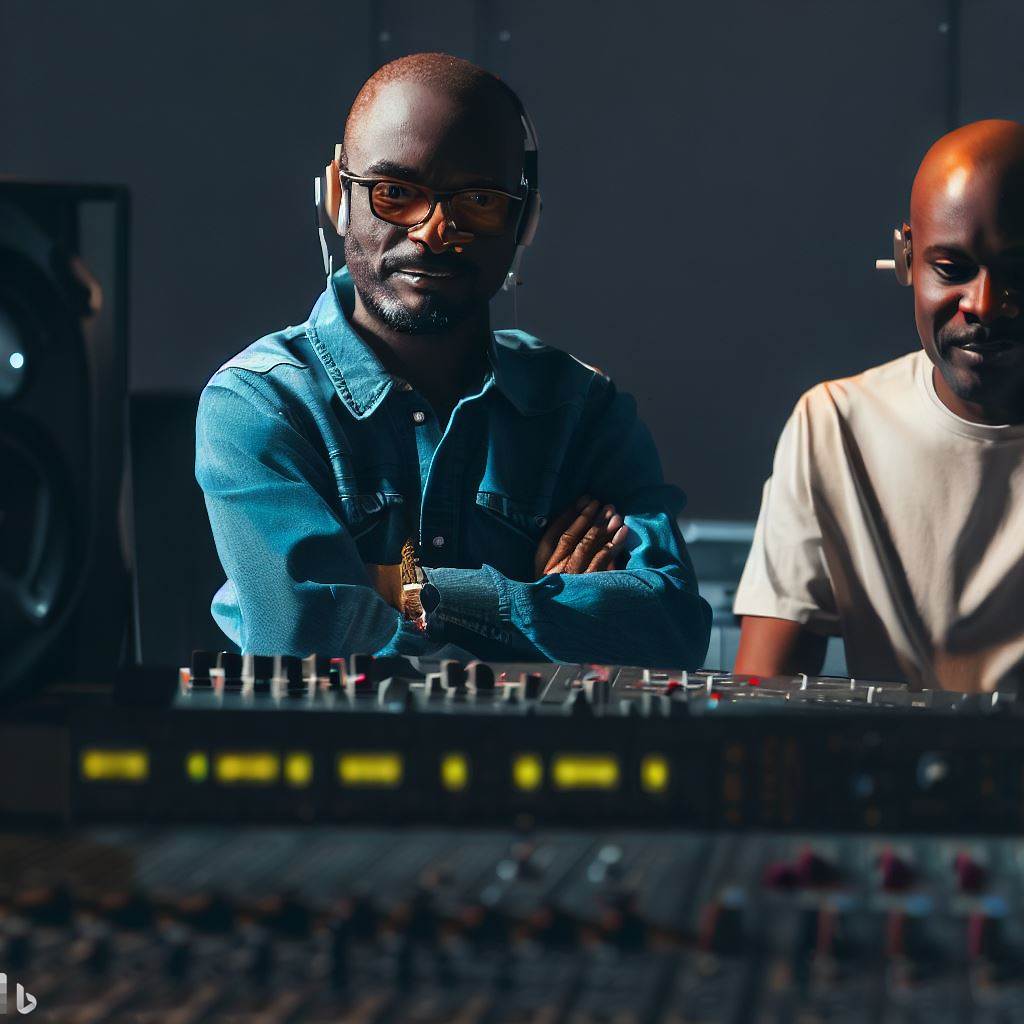Introduction
Examining the role of technology in Nigeria music production scene reveals its transformative impact on the industry.
Technology wields transformative power, reshaping Nigeria’s music production.
Globally, it’s a driving force behind:
- Creativity: Cutting-edge tools empower artists to experiment, innovate, and create unique sounds that define Nigerian music.
- Accessibility: Digital platforms enable widespread music distribution, reaching a global audience with ease.
- Quality Enhancement: Advanced software and hardware refine sound production, elevating the sonic experience for listeners.
- Collaboration: Virtual collaborations transcend geographical barriers, fostering partnerships among artists, producers, and songwriters.
- Genre Fusion: Technology enables the blending of traditional Nigerian rhythms with modern beats, birthing fresh genres.
In this section, we’ll delve deeper into how technology catalyzes a revolution in Nigeria’s vibrant music scene.
Background of Nigeria’s Music Production Scene
Overview of Nigeria’s music industry and its growth over the years
The country’s multiculturalism and rich musical heritage have contributed to the diverse and vibrant music scene.
In the past, traditional methods dominated the music production scene in Nigeria. These methods were deeply rooted in cultural practices and involved the use of indigenous musical instruments.
Music was often produced in communal settings, with musicians and singers coming together to create captivating melodies.
The transition from traditional to modern music production methods in Nigeria began in the 1960s with the emergence of highlife music.
Traditional methods of music production in Nigeria
This genre blended traditional West African rhythms with elements of jazz and Latin music, giving birth to a new sound that captivated audiences.
Highlife music introduced the use of Western musical instruments such as guitars, keyboards, and brass instruments.
As technology advanced, Nigeria’s music production scene evolved further. The 1980s saw a surge in the popularity of Afrobeat, a genre pioneered by the legendary Fela Kuti.
Afrobeat combined elements of traditional Nigerian music, jazz, funk, and soul, and incorporated the use of synthesizers and drum machines.
With the advent of computers and digital recording equipment, music production in Nigeria took another leap forward.
Artists and producers embraced digital audio workstations (DAWs), allowing them to create, edit, and mix music using software.
This shift from analog to digital production greatly enhanced the efficiency and quality of music production.
Transform Your Career in Nigeria
Discover unmatched expertise with our personalized Career Consulting service. Navigate Nigeria’s job market with a strategy tailored just for you.
Get StartedInfluence of technology
Today, Nigeria’s music production scene is heavily influenced by technology. The rise of home studios and affordable recording equipment has lowered the barriers to entry for aspiring musicians and producers.
This has led to a surge in the number of independent artists and a more diverse range of music being produced.
Furthermore, advancements in music production software and plugins have provided artists and producers with a wide range of tools and effects to experiment with.
This has enabled them to push the boundaries of creativity and produce professional-sounding music from the comfort of their own homes.
The internet has also played a significant role in the growth of Nigeria’s music production scene.
Artists can now easily distribute their music online through streaming platforms and social media, reaching a global audience without the need for traditional record labels or physical distribution.
Nigeria’s music production scene has undergone a remarkable transformation over the years, thanks to advancements in technology.
From traditional communal settings to digital home studios, technology has revolutionized the way music is created, recorded, and distributed in Nigeria.
As technology continues to evolve, the music industry in Nigeria is expected to thrive and produce even more innovative and exciting sounds.
Read: The Impact of Nigerian Music Producers on Global Sounds
Technology’s Impact on Nigeria’s Music Production
In recent years, advancements in technology have revolutionized the music production landscape in Nigeria.
The accessibility and affordability of music production tools and software have changed the game for aspiring musicians and producers.
Transformation of the Music Production Landscape
Gone are the days when expensive studio equipment and personnel were necessary to produce high-quality music.
Technology has made it possible for anyone with a computer and basic knowledge to create professional-sounding tracks.
One of the most significant achievements of technology is the democratization of music production.
Talented individuals who would have otherwise been excluded now have a platform to showcase their creativity and skills without financial limitations.
The availability of affordable music production tools and software has given rise to a thriving community of independent producers and artists.
Accessibility and Affordability
The rise of digital platforms and online marketplaces has made music production tools and software easily accessible to Nigerians
With just a few clicks, aspiring musicians can download software, plugins, and sample packs.
In the past, purchasing music production equipment was a costly endeavor, limiting the number of people who could enter the industry
However, technology has significantly brought down the cost, making it more affordable for individuals on a budget.
Furthermore, the popularity of smartphones has contributed to the accessibility of music production.
Mobile devices now come with built-in music production apps, allowing users to create beats and record vocals on the go.
The Role of Digital Audio Workstations (DAWs)
Digital audio workstations (DAWs) play a vital role in the music production process. These software applications provide the necessary tools and features to record, edit, mix, and master music.
Publish Your Professional Profile, Business or Brand
Showcase your expertise, gain trust, and boost visibility instantly on Professions.ng.
Publish NowDAWs have become the central hub for musicians and producers. They offer a wide range of virtual instruments, effects, and plugins that emulate the sounds of traditional studio gear.
With the help of DAWs, artists can experiment with different sounds, layer tracks, and create complex arrangements without the need for an expensive studio setup.
Additionally, DAWs have simplified the collaboration process. Artists can now work remotely, sharing project files with collaborators who can contribute their parts from different locations.
The Future of Nigeria’s Music Production
As technology continues to advance, the music production scene in Nigeria is poised to witness even more growth and innovation.
With the increasing availability of affordable tools, we can expect to see a surge in music production talent.
The rise of AI and machine learning also offers exciting possibilities for the future. These technologies can assist musicians in creating unique sounds, automating repetitive tasks, and even producing entire tracks.
Overall, technology has democratized music production in Nigeria, making it accessible to a wider range of individuals.
Read: Nigeria’s Influence on Global Costume Design Trends
Creativity and Experimentation
In the vibrant music production scene of Nigeria, technology plays a pivotal role in fostering creativity and allowing producers to experiment with different sounds and genres.
With the advent of modern digital tools and software, Nigerian music producers have been able to push boundaries and create groundbreaking music that resonates with audiences worldwide.
This blog section explores how technology has revolutionized the Nigerian music production scene, fostering creativity and ushering in a new era of experimentation.
Exploring Sounds and Genres
- Technology allows Nigerian music producers to experiment with a wide range of sounds.
- From traditional African beats to contemporary electronic elements, the possibilities are endless.
- Producers can seamlessly blend various genres, creating unique and captivating musical compositions.
- Sampling, synthesizers, and virtual instruments provide producers with an extensive palette of sounds to explore.
- Through technology, Nigerian music producers are able to continuously evolve their sound and surprise listeners.
Fusing Tradition with Modernity
- One of the most fascinating aspects of Nigerian music production is the fusion of traditional and modern elements.
- Technology has enabled producers to incorporate traditional Nigerian instruments and rhythms into their music.
- By combining these elements with contemporary electronic sounds, producers create a unique sonic experience.
- Artists like Burna Boy and Wizkid have successfully embraced this fusion, garnering international acclaim.
- The marriage of tradition and modernity showcases the rich cultural heritage of Nigeria in a contemporary context.
Success Stories and Inspiration
- Many Nigerian musicians have harnessed the power of technology to elevate their music to new heights.
- Davido, a prominent Nigerian artist, has embraced technology, incorporating innovative production techniques into his music.
- Producer Sarz, known for his collaboration with Wizkid, creates infectious beats using advanced music production software.
- With the help of technology, Divine Ikubor, popularly known as Rema, has emerged as one of Nigeria’s hottest young talents.
- These success stories serve as inspiration for aspiring Nigerian musicians to harness technology and unleash their creativity.
Technology has revolutionized the music production scene in Nigeria. With the freedom to experiment, Nigerian music producers continuously push boundaries, exploring a myriad of sounds and genres.
The fusion of traditional Nigerian music with modern electronic elements creates a unique sonic landscape that resonates with audiences globally.
The success of Nigerian musicians who have embraced technology serves as motivation for aspiring artists to explore the endless possibilities that technology offers.
The role of technology in Nigeria music production scene cannot be understated, as it continues to shape and define the sound of Nigerian music in the 21st century.
Read: Earnings and Revenue: The Financial Side of Nigerian Music Production

Collaboration and Global Reach
Technology has revolutionized Nigeria’s music production, enhancing collaboration and global reach. Digital audio workstations (DAWs) and file-sharing platforms enable seamless remote work.
Social media platforms (Instagram, Twitter, Facebook) connect musicians, producers, and fans, amplifying interaction.
These platforms serve as launchpads for global fanbase expansion. Spotify, Apple Music, etc., allow Nigerian music to span the globe.
Burna Boy used social media to go international, uniting Afrobeat, reggae, hip-hop, and attracting Beyoncé and Stormzy.
Wizkid’s partnerships with Drake, Skepta thrust him into global stardom.
Davido’s online presence, joint efforts with Chris Brown, Meek Mill spotlight Nigerian music’s vibrance. Through technology, Nigerian artists thrive globally, reshaping the music landscape.
Challenges and Future Prospects
Challenges Faced by Nigerian Music Producers
- Limited access to technology: Due to financial constraints, many Nigerian music producers struggle to afford the latest music production equipment and software.
- Unreliable internet connectivity: Slow and inconsistent internet connections hinder producers from collaborating with international artists and accessing online resources.
The Need for Infrastructure Development and Investment
- Infrastructure development: Nigeria requires the establishment of modern music production studios and facilities across the country to support its growing music industry.
- Investment in technology education: It is crucial to provide training and educational programs to equip aspiring producers with the required technical skills.
The Potential for Further Growth and Innovation
- Accessibility for upcoming producers: Advancements in technology have made it easier for aspiring producers to create music from the comfort of their homes.
- Collaboration opportunities: With reliable internet connectivity, Nigerian producers can collaborate with artists from around the world, expanding their networks and exposure.
- Enhanced creativity and innovation: The availability of advanced music production tools and software enables Nigerian producers to experiment and push creative boundaries.
- Increased global recognition: As Nigerian music producers continue to improve their production quality, the international music industry recognizes their talent and contributions.
- Economic growth: The music industry in Nigeria has the potential to contribute significantly to the country’s economy through increased exports and tourism.
The Advancement of Technology
- Revolutionary software and equipment: Technological advancements in software and equipment offer Nigerian music producers access to high-quality tools for their craft.
- Mobile music production: Mobile applications and devices allow producers to work on their projects on the go, increasing efficiency and productivity.
- Online streaming platforms: Platforms like Spotify, Apple Music, and YouTube Music provide Nigerian producers with wider distribution opportunities and revenue streams.
- Virtual reality and augmented reality: These emerging technologies can provide immersive and unique experiences for music consumers, allowing producers to explore innovative ways of engaging audiences.
- Artificial intelligence integration: AI can assist in music production tasks, such as composition, arrangement, and mixing, enhancing productivity and creativity.
The role of technology in Nigeria music production scene is constantly evolving, shaping the future prospects of the industry.
Despite challenges like limited access to technology and unreliable internet connectivity, the country has immense potential for growth and innovation.
Nigerian producers, through infrastructure growth, tech education, and music tool advancements, propel global music impact and local economic upturn.
Read: Understanding The Translator Profession in Nigeria: A Guide
Conclusion
Technology has played a crucial role in transforming Nigeria music production scene. It has revolutionized the way artists create, collaborate, and share their music.
One of the major positive impacts of technology is its ability to enhance creativity.
Musicians utilize diverse digital tools for sound experimentation, incorporating varied samples and beats, thereby pushing artistic boundaries.
Furthermore, technology has fostered collaboration among musicians both within Nigeria and on a global scale.
Artists can now easily connect and collaborate with fellow musicians, producers, and songwriters from different parts of the world, enriching their music with diverse influences and perspectives.
Lastly, technology has greatly expanded the reach of Nigerian music beyond its borders.
Through online platforms, social media, and streaming services, Nigerian artists can now share their music with a global audience, attracting international recognition and opening up new opportunities for growth and success.
It is crucial for the Nigerian music industry to further explore and embrace technology.
In Nigeria’s music scene, artists and industry experts propel growth through active adoption of advanced software, production, and marketing.
Overall, technology has proven to be a powerful tool in shaping Nigeria’s music production scene.
Its positive impact on creativity, collaboration, and global reach should be embraced and further integrated into the music industry for continued growth and success in Nigeria.




